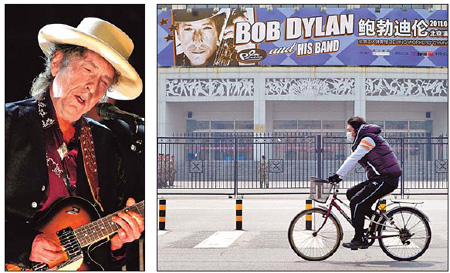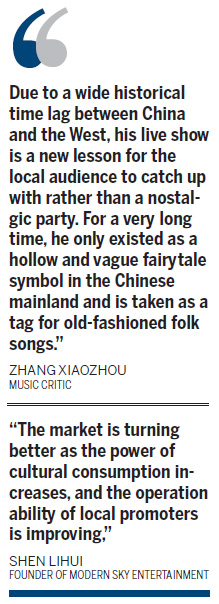

Promoters believe Dylan show heralds new era for Western music in China, report Jiang Xueqing and Mu Qian in Beijing.
Right after he got a ticket for Bob Dylan's concert in Beijing, Song Xianyuan took a picture of it and posted it on his micro blog. Although not a Dylan fan, he paid 680 yuan ($103) to witness what he called "a historic moment".
 The Eagles, playing to a packed arena in Shanghai on March 9, has been around - in the West - since 1971, but is new to China. The Eagles' tour promoter is also handling Bob Dylan's two China concerts. Provided to China Daily |
"When an influential superstar like Dylan comes to China, you should be there to watch his show, whether you are a fan or not," Song said. A student at North China Electric Power University in Beijing, Song, 21, views Dylan as a cultural icon rather than a folksinger and songwriter.
He admitted that he doesn't even like Dylan's music. "His coarse voice sounds like a broken gong and the arrangement of guitar with harmonica can irritate those who are not used to it." Nonetheless, he downloaded Dylan's major albums for a quick brush-up.
Dylan's China tour, scheduled to start at Beijing Workers' Gymnasium on Wednesday before closing in Shanghai two days later, is the first visit to the country by the singer, who turns 70 in May.
 Dylan, performing in 2009 in Southern California, brings his unique style to China this week. A cyclist rode past his Beijing concert venue, Workers' Gymnasium, on Tuesday, the day before his first concert. File photo Frederic J. Brown / AFP? |
Tuesday, a "sold out" notice was posted on the website of the tour promoter, Gehua Live Nation Entertainment and Sports. More than half of the 5,000-plus tickets for sale in Beijing had been booked before sales even started, said Gehua's general manager, Wei Ming.
The promoter had set the price for VIP tickets at 1,961.411 yuan to commemorate the day when Dylan played his first major gig in New York City, April 11, 1961. Those tickets were gone by March 30.
'Getting very close'
Dylan isn't the only big American name whirling on the Chinese stage this year. A month ago, pop music lovers packed the MasterCard Center in Beijing and the Mercedes-Benz Arena in Shanghai as the Eagles played the fans' favorite, Hotel California.

"We win in both cities," said Wei, whose company also promoted the Eagles' China tour.
His team has been working overtime on several big projects since Christmas. After Dylan, it will have Avril Lavigne, Linkin Park and an international pop music festival in the Beijing suburb of Pinggu.
"International live performance will boom on the Chinese mainland just like Hong Kong and Taiwan pop music singers did 20 years ago," he said. "We used to think it would take probably five years for that day to come, but we feel we're getting very close to it."
Such a fast development amazed Shen Lihui, the founder of Modern Sky Entertainment. Four years ago, when several thousand fans stood in pouring rain at the first Modern Sky Festival, shouting for the American indie rock band Yeah Yeah Yeahs, he didn't imagine that music festivals in China would grow from three or four in 2007 to more than 60 in 2010.
It's likely the number will climb over 80 this year, providing more opportunities for Western artists to perform in China, Shen said. As one of the most established Chinese music festivals that often invite foreign musicians, this year's Midi Festival, to be held April 30-May 2 at Beijing's Haidian Park, will have Mr Big as the headliner.
Something new, foreign
Moving forward in parallel with music festivals, live house is getting popular, with several thousand shows a year nationwide. These live shows are played in clubs, bars or other venues with a capacity of 1,000 at most.
"The market is turning better as the power of cultural consumption increases, and the operation ability of local promoters is improving," Shen said.
With the popularization of the Internet and the increase of international communication, today's Chinese audience has a much better taste for live music than 30 years ago, when the country wasn't open to Western pop musicians.
In 1985, British duo Wham! became the first major Western act to perform in China. The group was embraced by excited and curious young Chinese who expected to see something new, something foreign.
In Beijing, 300 people waited all night for the tickets. A man wearing a blue overcoat asked a member of the group' crew, "How many people in your band?"
Wham! in China - Foreign Skies, a documentary film about the group's China tour, included scenes from its concerts in Beijing and Guangzhou: When George Michael encouraged the audience to clap to the beat with him, the audience burst into a long applause to show politeness. When a performer stepped down from the stage to dance among the audience, most were bewildered.
"Few people had heard of the band before going to the show, but at that time there were so few Western pop musicians coming to perform in China that we tried to grab any opportunity," said Liang Heping, a veteran rock and jazz musician who was beginning his career as a keyboardist at that time.
A ticket to the concert was priced at 5 yuan, and it included two cassettes of the group. Wham!'s manager Simon Napier-Bell later admitted that the China tour was a masterly publicity scheme that attracted wide media coverage of the group.
Promotion still young
Western pop musicians used to ignore the Chinese market, said Wei of Gehua Live Nation. "No artist wants to go to a no man's land. They are afraid of commercial failure."
Their concern was based on complex but rational reasons, he said:
Despite the high cost of international travel, performers can give one or two shows in China because the audience is much smaller compared with the US and Europe.
It's hard to predict the size of the market for a Western singer or a band. China lacks solid statistics of record distribution because of piracy and the underdevelopment of the music market.
World tours by international stars have high requirements on production, accommodation and the local consumption power, which China did not meet in the past.
Through the 1980s and 1990s, Western artists including Paul Simon, John Denver and Bjork toured China, but none achieved great commercial success. There was no Chinese company devoted to promoting Western pop musicians.
It was only since the 2000s, when wide use of the Internet popularized knowledge of international pop music, that more Western artists began to include China as a leg of their worldwide tours. Presenting performances of foreign acts became a profitable business.
Western artists who have toured China in recent years include the Rolling Stones, Eric Clapton, Roger Waters, Deep Purple, Sonic Youth, Usher, Beyonce, Norah Jones, and the Black Eyed Peas.
"Just like Prada opens a new flagship store, the Chinese market for live shows keeps growing," said music critic Zhang Xiaozhou. "The only difference is that rich people's demands for cultural activities are not as huge as their demands for luxuries."
Playing catch-up
Among all the international artists, only about 10-20 are popular enough in China to perform in venues that can seat more than 6,000 people, according to Shen of Modern Sky Entertainment.
"Stars like U2, Coldplay and Lady Gaga will be well received," he said. "Some other big names, such as Kayne West, didn't conquer the box office during their China tour, for the local people don't share the same memory (of music, culture and history) with the Western audience."
Even Bob Dylan isn't widely accepted in China. Many people think his music is too old and historical, while only a few truly understand the essence of his folk songs, said Zhang Yiming, event and media director of China Arts and Entertainment Group. But Zhang had no doubt the tickets would sell out, as more and more white-collar workers are willing to pay for an arty-crafty party.
"For China, Dylan is a 70-year-old young stranger," music critic Zhang Xiaozhou said.
"Due to a wide historical time lag between China and the West, his live show is a new lesson for the local audience to catch up with rather than a nostalgic party. For a very long time, he only existed as a hollow and vague fairytale symbol in the Chinese mainland and is taken as a tag for old-fashioned folk songs."
The procedures of getting government approval for the shows are also too complicated for the healthy development of the market, according to Zhang.
"The system of approval sets obstacles to promoters, rather than encouraging them to explore the market," Zhang said. "People are worried that the concert will probably go down the toilet, or they won't have enough time to get a return on their investment. With all these concerns, who would like to sponsor such events?"
Records first?
The underdeveloped Chinese music industry also challenges the development of the live music market, according to industry insiders. Chinese record companies struggle to survive, yet they don't promote Western artists via traditional media and the Internet.
Instead, the audience randomly picks up scattered pieces of information about the artists out of a large amount of information online. Lack of publicity in mainstream media leaves the artists unknown, so there's no ready-made audience to buy tickets for live shows.
"It's necessary to make the Chinese audience know their music first by introducing foreign artists through record importation and distribution, even though the record market is small," Shen said.
Changes in regulations could make that easier, Shen said. According to the current procedure, it takes several months for a record to be approved for importation and distribution. By the time the record hits the market, its pirated versions are already everywhere and the audience can download its songs from the Internet.
Shen also suggested that promoters further develop the live music market in medium-sized venues that can sell 2,000-3,000 tickets, because many Western artists fit that size.
"For quite a long time, there was nothing in the market but live concerts in big venues that can seat 6,000 people at least," he said. "But the real market should be like a pyramid, with live house at the bottom, medium-sized venues in the middle and big venues on the top."
How to run a commercially successful performance in a medium-sized venue presents both challenges and opportunities to promoters, who shoulder the major responsibilities of building a system to promote Western artists. Some are already publicizing the artists through music festivals, which enjoy large audiences and wide media coverage.
"If they keep moving, they'll make changes in three years," Shen said.







